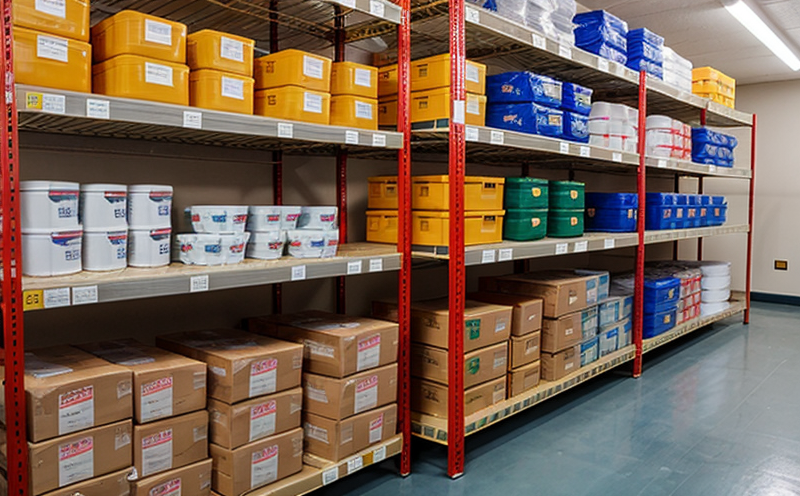Dissolution Profile Stability Testing
In the pharmaceutical industry, ensuring drug product quality and efficacy over time is paramount. Dissolution profile stability testing plays a critical role in this regard by assessing how well a drug dissolves under specified conditions, which can influence its bioavailability and ultimately patient outcomes.
The dissolution test measures the rate and extent of active ingredients being released from solid oral dosage forms like tablets or capsules into a simulated gastrointestinal fluid. This process is essential for understanding whether the drug formulation meets regulatory requirements and ensures consistent performance over shelf life.
For many pharmaceutical products, especially those with complex polymorphs or sensitive APIs (active pharmaceutical ingredients), maintaining accurate dissolution profiles throughout their shelf life is crucial. Dissolution profile stability testing helps identify potential issues early on by comparing initial batch data against subsequent batches at various time points during storage periods.
This service typically involves running a series of tests over extended durations, often several months or even years depending on the product's projected shelf life. These tests simulate actual usage conditions as closely as possible while adhering to strict guidelines set forth by organizations like FDA and EMA. By doing so, manufacturers can gain valuable insights into how their products behave under real-world circumstances.
Using advanced analytical techniques such as high-performance liquid chromatography (HPLC), near-infrared spectroscopy (NIR), or differential scanning calorimetry (DSC), laboratories perform precise measurements of drug dissolution rates. The collected data is then analyzed statistically to determine whether any significant changes have occurred over time.
Accurate and reliable dissolution profile stability testing ensures compliance with Good Manufacturing Practices (GMP) regulations, which are designed to protect public health by ensuring that drugs are safe, effective, and consistently produced according to approved specifications. This service not only supports ongoing product development but also facilitates successful submission of New Drug Applications (NDAs).
Pharmaceutical companies leverage dissolution profile stability testing results to make informed decisions about process improvements, formulation adjustments, or even reformulation efforts if necessary. It serves as an important tool in maintaining high standards throughout the entire lifecycle of a drug product.
In summary, dissolution profile stability testing is essential for ensuring consistent quality and efficacy in pharmaceutical products over their intended shelf lives. By providing thorough analysis and valuable insights into potential challenges early on, this service helps safeguard patient health while supporting regulatory compliance.
Industry Applications
- Developing new formulations to improve bioavailability
- Evaluating changes in manufacturing processes
- Assessing the impact of excipients on dissolution behavior
- Determining optimal storage conditions for extended shelf life stability
Competitive Advantage and Market Impact
Implementing robust dissolution profile stability testing strategies can provide significant competitive advantages within the pharmaceutical sector. Organizations that excel in this area demonstrate their commitment to producing high-quality products, thereby enhancing brand reputation among consumers.
In terms of market impact, companies able to consistently deliver reliable drug performance contribute positively towards overall healthcare quality standards. They also position themselves favorably against competitors who may struggle with maintaining consistent product quality across different batches or over extended periods.
Moreover, compliance with stringent regulatory requirements can open up opportunities for international markets where adherence to local standards is crucial. This not only expands geographical reach but also fosters trust among regulatory bodies and healthcare professionals worldwide.
Use Cases and Application Examples
A prime example of dissolution profile stability testing involves a hypothetical case study where Company X developed a novel oral contraceptive tablet. During the early stages of clinical trials, it became apparent that some batches exhibited variable dissolution rates despite identical manufacturing processes.
To address this issue, Company X contracted our laboratory for comprehensive dissolution profile stability testing. Over six months, multiple tests were conducted at regular intervals using standardized HPLC methods. Initial findings revealed discrepancies between the first batch and subsequent ones, particularly concerning peak heights indicative of active ingredient release.
Upon further investigation, it was discovered that minor variations in granulation procedures led to inconsistencies in particle size distribution. Armed with this knowledge, Company X made necessary adjustments to their production line settings, resulting in more uniform tablets across all batches thereafter. Subsequent stability testing showed consistent dissolution profiles throughout the expected shelf life.
This successful outcome exemplifies how thorough dissolution profile stability testing can uncover underlying issues early on, allowing for timely corrective actions that ultimately enhance product quality and reliability.





